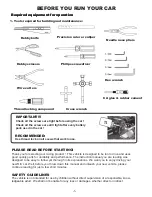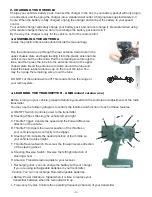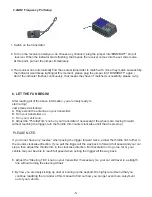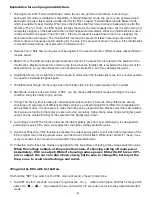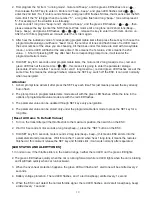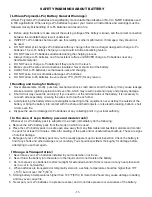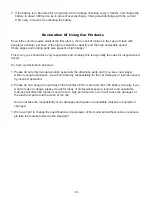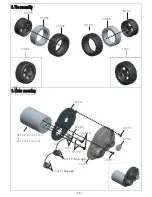
-11-
SAFETY WARNINGS ABOUT BATTERY
【
Lithium Polymer(Li-Po) Battery General Warnings
】
Lithium Polymer(Li-Po) batteries are significantly more volatile than Alkaline or Ni-Cd / Ni-MH batteries used
in R/C applications. When using Li-Po batteries to power your model, all instructions and warnings must be
followed closely. Mishandling of Li-Po batteries can result in fire.
● Before using the battery, make sure all the working voltage of the battery is known and the correct connection
between the model&charger is well understood.
● INSPECT Li-Po batteries before each use for swelling or other malformation. If damaged, they should not
be used.
● DO NOT attempt to charge Li-Po batteries with any charger other than a charger designed to charge Li-Po
batteries. The Li-Po battery charger you use should include a balancing feature.
● DO NOT leave Li-Po batteries unattended during the charging process.
● Always charge Li-Po batteries on a fire-resistant surface and NEVER charge Li-Po batteries near any
flammable material.
● DO NOT use or charge Li-Po batteries if they are hot to the touch.
● Make sure all the wires and connections insulated. Never short-circuit the battery.
● ALWAYS let Li-Po batteries cool betweens uses and charging.
● DO NOT poke, bend or otherwise damage Li-Po batteries.
● DO NOT allow Li-Po batteries to ever exceed 71 C (160 F) for any reason.
【
Handling and Caring for Battery
】
●
Never disassemble, modify, puncture, mechanical shock, crash and/or short the battery, it may cause leakage,
smoke emission, ignition,explosion and even fire, which may result in personal injury and property damage.
● Short circuit may cause fire and injury! If you need to cut the terminal wires of the battery, it is necessary to
cut each wire seperately, ensuring the wires not to touch each other.
● Avoid pressing the battery while connecting/disconnecting to the equipment, never dsitroy the outside of the
battery or bring the battery into contact with the sharp and hard odjects, or else lead to leaking, balloon, short
circuit, even fire.
● Dispose the used or damaged Li-Po batteries at any collecting point in your local authority.
【
In the case of Li-po Battery powered model crash
】
Whenever a Li-Po battery pack is subjected to a crash, immediately do the following:
● Remove the Li-Po battery pack from the model in which it is used.
● Place the Li-Po battery pack in a safe open area away from any flammable/combustible materials and monitor
the pack for at least 30 minutes. Watch for swelling of the pack and/or unnatural heat build-up. These are signs
of internal damage.
● Damage of your Li-Po battery pack may not be readily apparent upon visual inspection. Check the battery to
find if any shorts and other damages occur carefully. You should inspectthem thoroughly for damage before
attempting to use them again.
【
Storage & Transportation
】
1
.
Never leave your Li-Po batteries installed in your model when not in use.
2
.
Never throw the battery into the water or other liquid, and do not moisten the battery.
3
.
Do not expose Li-po batteries to direct sunlight for extended period of time or leave it at any heat place such
as in a car in hot weather.
4
.
When batteries are transported or temporarily stored in a vehicle, temperature should be higher than 14 F
(-10 C) but not over 140 F (60 C)
5. Storing battery at temperatures higher than 140 F(60 C) for more than2 hours may cause damage to battery
and may even cause fire.
6. Never put your Li-Po batteries in a pressure vessel, and do not take pressure or vacuumize of the battery.
º
º
º
º
º
º
º
º


